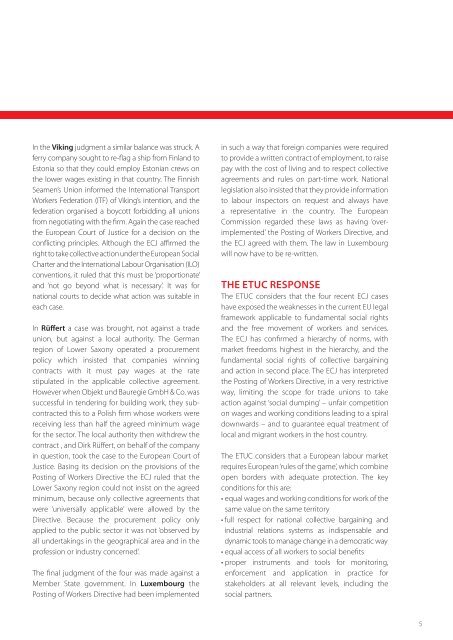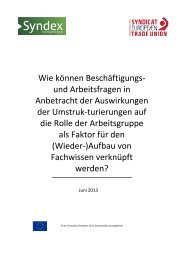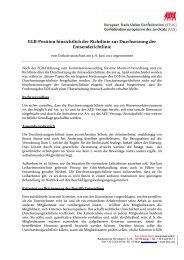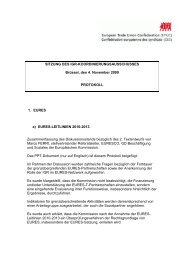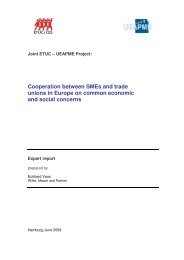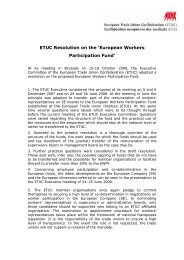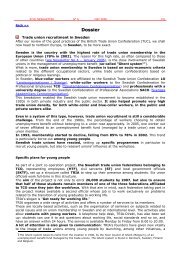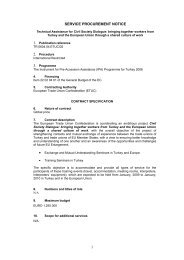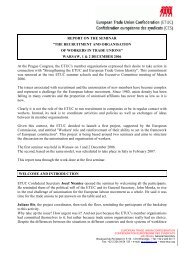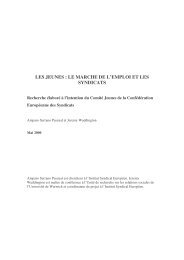Trade unions and free movement of workers in the ... - ETUC
Trade unions and free movement of workers in the ... - ETUC
Trade unions and free movement of workers in the ... - ETUC
Create successful ePaper yourself
Turn your PDF publications into a flip-book with our unique Google optimized e-Paper software.
In <strong>the</strong> Vik<strong>in</strong>g judgment a similar balance was struck. A<br />
ferry company sought to re-flag a ship from F<strong>in</strong>l<strong>and</strong> to<br />
Estonia so that <strong>the</strong>y could employ Estonian crews on<br />
<strong>the</strong> lower wages exist<strong>in</strong>g <strong>in</strong> that country. The F<strong>in</strong>nish<br />
Seamen’s Union <strong>in</strong>formed <strong>the</strong> International Transport<br />
Workers Federation (ITF) <strong>of</strong> Vik<strong>in</strong>g’s <strong>in</strong>tention, <strong>and</strong> <strong>the</strong><br />
federation organised a boycott forbidd<strong>in</strong>g all <strong>unions</strong><br />
from negotiat<strong>in</strong>g with <strong>the</strong> firm. Aga<strong>in</strong> <strong>the</strong> case reached<br />
<strong>the</strong> European Court <strong>of</strong> Justice for a decision on <strong>the</strong><br />
conflict<strong>in</strong>g pr<strong>in</strong>ciples. Although <strong>the</strong> ECJ affirmed <strong>the</strong><br />
right to take collective action under <strong>the</strong> European Social<br />
Charter <strong>and</strong> <strong>the</strong> International Labour Organisation (ILO)<br />
conventions, it ruled that this must be ‘proportionate’<br />
<strong>and</strong> ‘not go beyond what is necessary’. It was for<br />
national courts to decide what action was suitable <strong>in</strong><br />
each case.<br />
In Rüffert a case was brought, not aga<strong>in</strong>st a trade<br />
union, but aga<strong>in</strong>st a local authority. The German<br />
region <strong>of</strong> Lower Saxony operated a procurement<br />
policy which <strong>in</strong>sisted that companies w<strong>in</strong>n<strong>in</strong>g<br />
contracts with it must pay wages at <strong>the</strong> rate<br />
stipulated <strong>in</strong> <strong>the</strong> applicable collective agreement.<br />
However when Objekt und Bauregie GmbH & Co. was<br />
successful <strong>in</strong> tender<strong>in</strong>g for build<strong>in</strong>g work, <strong>the</strong>y subcontracted<br />
this to a Polish firm whose <strong>workers</strong> were<br />
receiv<strong>in</strong>g less than half <strong>the</strong> agreed m<strong>in</strong>imum wage<br />
for <strong>the</strong> sector. The local authority <strong>the</strong>n withdrew <strong>the</strong><br />
contract , <strong>and</strong> Dirk Rüffert, on behalf <strong>of</strong> <strong>the</strong> company<br />
<strong>in</strong> question, took <strong>the</strong> case to <strong>the</strong> European Court <strong>of</strong><br />
Justice. Bas<strong>in</strong>g its decision on <strong>the</strong> provisions <strong>of</strong> <strong>the</strong><br />
Post<strong>in</strong>g <strong>of</strong> Workers Directive <strong>the</strong> ECJ ruled that <strong>the</strong><br />
Lower Saxony region could not <strong>in</strong>sist on <strong>the</strong> agreed<br />
m<strong>in</strong>imum, because only collective agreements that<br />
were ‘universally applicable’ were allowed by <strong>the</strong><br />
Directive. Because <strong>the</strong> procurement policy only<br />
applied to <strong>the</strong> public sector it was not ‘observed by<br />
all undertak<strong>in</strong>gs <strong>in</strong> <strong>the</strong> geographical area <strong>and</strong> <strong>in</strong> <strong>the</strong><br />
pr<strong>of</strong>ession or <strong>in</strong>dustry concerned’.<br />
The f<strong>in</strong>al judgment <strong>of</strong> <strong>the</strong> four was made aga<strong>in</strong>st a<br />
Member State government. In Luxembourg <strong>the</strong><br />
Post<strong>in</strong>g <strong>of</strong> Workers Directive had been implemented<br />
<strong>in</strong> such a way that foreign companies were required<br />
to provide a written contract <strong>of</strong> employment, to raise<br />
pay with <strong>the</strong> cost <strong>of</strong> liv<strong>in</strong>g <strong>and</strong> to respect collective<br />
agreements <strong>and</strong> rules on part-time work. National<br />
legislation also <strong>in</strong>sisted that <strong>the</strong>y provide <strong>in</strong>formation<br />
to labour <strong>in</strong>spectors on request <strong>and</strong> always have<br />
a representative <strong>in</strong> <strong>the</strong> country. The European<br />
Commission regarded <strong>the</strong>se laws as hav<strong>in</strong>g ‘overimplemented’<br />
<strong>the</strong> Post<strong>in</strong>g <strong>of</strong> Workers Directive, <strong>and</strong><br />
<strong>the</strong> ECJ agreed with <strong>the</strong>m. The law <strong>in</strong> Luxembourg<br />
will now have to be re-written.<br />
THE <strong>ETUC</strong> RESPONSE<br />
The <strong>ETUC</strong> considers that <strong>the</strong> four recent ECJ cases<br />
have exposed <strong>the</strong> weaknesses <strong>in</strong> <strong>the</strong> current EU legal<br />
framework applicable to fundamental social rights<br />
<strong>and</strong> <strong>the</strong> <strong>free</strong> <strong>movement</strong> <strong>of</strong> <strong>workers</strong> <strong>and</strong> services.<br />
The ECJ has confirmed a hierarchy <strong>of</strong> norms, with<br />
market <strong>free</strong>doms highest <strong>in</strong> <strong>the</strong> hierarchy, <strong>and</strong> <strong>the</strong><br />
fundamental social rights <strong>of</strong> collective barga<strong>in</strong><strong>in</strong>g<br />
<strong>and</strong> action <strong>in</strong> second place. The ECJ has <strong>in</strong>terpreted<br />
<strong>the</strong> Post<strong>in</strong>g <strong>of</strong> Workers Directive, <strong>in</strong> a very restrictive<br />
way, limit<strong>in</strong>g <strong>the</strong> scope for trade <strong>unions</strong> to take<br />
action aga<strong>in</strong>st ‘social dump<strong>in</strong>g’ – unfair competition<br />
on wages <strong>and</strong> work<strong>in</strong>g conditions lead<strong>in</strong>g to a spiral<br />
downwards – <strong>and</strong> to guarantee equal treatment <strong>of</strong><br />
local <strong>and</strong> migrant <strong>workers</strong> <strong>in</strong> <strong>the</strong> host country.<br />
The <strong>ETUC</strong> considers that a European labour market<br />
requires European ‘rules <strong>of</strong> <strong>the</strong> game’, which comb<strong>in</strong>e<br />
open borders with adequate protection. The key<br />
conditions for this are:<br />
• equal wages <strong>and</strong> work<strong>in</strong>g conditions for work <strong>of</strong> <strong>the</strong><br />
same value on <strong>the</strong> same territory<br />
• full respect for national collective barga<strong>in</strong><strong>in</strong>g <strong>and</strong><br />
<strong>in</strong>dustrial relations systems as <strong>in</strong>dispensable <strong>and</strong><br />
dynamic tools to manage change <strong>in</strong> a democratic way<br />
• equal access <strong>of</strong> all <strong>workers</strong> to social benefits<br />
• proper <strong>in</strong>struments <strong>and</strong> tools for monitor<strong>in</strong>g,<br />
enforcement <strong>and</strong> application <strong>in</strong> practice for<br />
stakeholders at all relevant levels, <strong>in</strong>clud<strong>in</strong>g <strong>the</strong><br />
social partners.<br />
5


